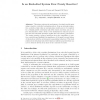Free Online Productivity Tools
i2Speak
i2Symbol
i2OCR
iTex2Img
iWeb2Print
iWeb2Shot
i2Type
iPdf2Split
iPdf2Merge
i2Bopomofo
i2Arabic
i2Style
i2Image
i2PDF
iLatex2Rtf
Sci2ools
119
Voted
ECAL
2005
Springer
2005
Springer
Is an Embodied System Ever Purely Reactive?
This paper explores the performance of a simple model agent using a reactive controller in situations where, from an external perspective, a solution that relies on internal states would seem to be required. In a visually-guided orientation task with sensory inversion and an object discrimination task a study of the instantaneous response properties and time-extended dynamics explain the non-reactive performance. The results question common intuitions about the capabilities of reactive controllers and highlight the significance of the agent’s recent history of interactions with its environment in generating behaviour. This work reinforces the idea that embodied behaviour exhibits properties that cannot be deduced directly from those of the controller by itself.
| Added | 27 Jun 2010 |
| Updated | 27 Jun 2010 |
| Type | Conference |
| Year | 2005 |
| Where | ECAL |
| Authors | Eduardo Izquierdo-Torres, Ezequiel A. Di Paolo |
Comments (0)

